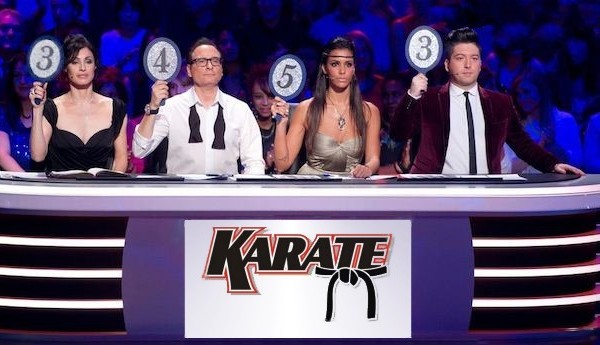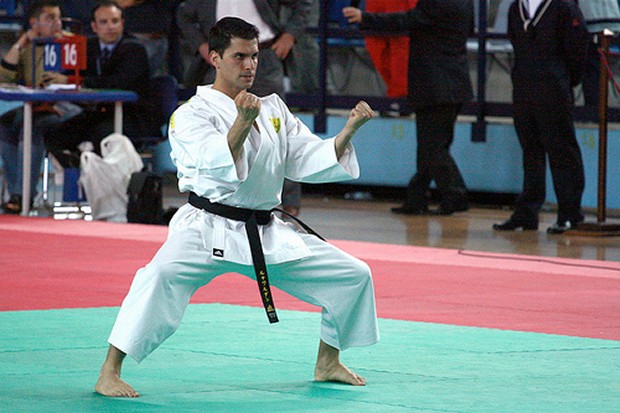To obtain a new rank should not be an absolute goal for a karate practitioner. Nevertheless, it can be a short-term personal objective or just the acknowledgement of your progression. Having been a jury in dan examinations for around fifteen years, I know that belt exams can cause stress to many karate practitioners, whatever their level is (kyu for colored belts, dan for black belts). However, during black belt exams, I am often surprised by the lack of preparation from many candidates (and I am not only talking about technique here).

On the day of the exam, you should put all the chances on your side and be ready to give the best of yourself. So, how can you prepare yourself and what mistakes should you avoid? Below are my 10 tips for successful karate belt exams which, I hope, will help you to better understand this examination, whether you are a beginner, an advanced practitioner, or even a black belt already. The first 5 tips focus on preparation, the next 5 are to help you on the very day of the exam. Those are valuable for kids and adults alike, and also for teachers looking to help their students. Good luck!
1 – Train with diligence
This is certainly the most important point, and it begins several months before the belt exam. Even if you feel like you are stagnating or if you are losing your motivation, try not to miss training. In addition, start your grading preparation early in the season: acquiring combat techniques, bunkais and katas come with time and repetition. For instance, to get from orange to green belt, you will need at least one year of regular practice. To get your 2nd dan, you will need 2 years of intense preparation! Conclusion: don’t start your preparation two or three months before the exam!
2 – Get to know the examination program
For a colored belt (kyu) exam (in your club), your teacher may have provided you with the technical requirements by grade when the season began. Moreover, you have already been evaluated by her/him, so you know what to expect. As for dan exams (with a federal jury, external to the club), I strongly recommend that you download the examination rules on your federation/association website. Read with care the description of the exam and the criteria on which you will be evaluated. Looks easy… however, how many times did I have to judge a candidate who did not know what was expected from her/him? ‘He sucks’, another member of the jury whispered to me. I answered: ‘No, his teacher sucks!’ I don’t understand how a teacher can send a student to a belt exam without proper preparation. It leads to unavoidable failure, but I saw it at every dan examination I have been attending for 15 years…
3 – Train with different partners
If you don’t want to get bad habits, get out of your comfort zone. Try to practice with different partners when sparring to ensure your techniques work, whoever the opponent is: choose partners with different belt colors, height, morphology, etc. On the day of the exam, you will face partners you don’t know, and you will most certainly not be able to choose… so be ready for anything!
4 – Keep your martial spirit up anytime
In martial arts, your mindset plays an important part in your progression, and in examinations too! So, make a habit of keeping your martial spirit up anytime: when training, in front of a partner, when you are practicing kihon or kata. You will not change the way you do karate on the day of the belt exam. Give the best of yourself at every training. Condition yourself as you would during the exam, mobilize your mind and body, be a warrior! Always practice with determination and don’t forget your kiai during kihon and kumite. Your teacher is asking for a volunteer to do a kata in front of your fellow karatekas? Raise your hand!
5 – Ask your teacher
Despite your efforts, if you doubt or don’t feel ready for the examination, ask your teacher about it. She/He is here to help you, to tell you if you are ready or not, and to help you focus on what you should improve in your karate. Of course, you should choose the right time to ask, when your teacher gives you feedback during class, or at the end of the training, not to disturb the other students. Keep in mind that for a dan examination, out of respect, you should ask your sensei before sending your application.

6 – On the day of the belt exam… be prepared!
Start D Day by being on time and in shape (no excess on the night before!). It is essential to manage properly your warm up: most of the time, you will not know precisely when it will be your turn, so stay ready. Personally, I teach individual warm up to my students several times during the season so that they can manage this on their own on the day of the exam. To have an effective warm up routine is to prevent additional stress. Practice your katas slowly and, if possible, in the same direction as when in front of the jury. It will provide you with visual references. Don’t forget to manage your physical capacity between each exercice (hydratation, food, breathing, stretching, etc.).
7 – Stay focused, stay alert
The best way to succeed is to stay focused during the whole exam: don’t speak, laugh or look at your phone. It is also important to respect the other candidates: pay attention to what they do. As you are likely to perform the same exercises, try not to make the same mistakes. During bunkais (a feared part of the exam), don’t speak too much, give clear and simple explanations to your partner, and position yourself correctly in front of the jury (of course, you can prepare to this months before the exam…). Finally, stay alert (zanshin) during kumite: your partner may even make a mistake by announcing a technique and doing another one (e.g. announcing mae geri and attacking with jodan oi tsuki!).
8 – Give your best and stay humble
If after the exam you think you could have done better, it is too bad, but above all, too late! Be ready as soon as you enter the locker rooms. For the first exercise, most often kihon, do a kiai right from the first technique and show what you got! Give your best while managing your physical condition all along the exam: you should feel exhausted at the end. However, don’t forget to control your techniques not to hurt your partners. Under stress, some candidates lose it, trying to crush their opponents, to knock them down, somehow to prove that their karate style is the best (which is the best way to fail the exam, of course).
9 – Show your karate, according to your level
Don’t underestimate yourself, but don’t try the impossible either: don’t attempt to show techniques you don’t master, just to impress the jury or because another candidate did it before you. Try to practice the karate that you know and the techniques you have been working on. For instance, if you are not flexible enough, don’t insist on going for a high kick during ippon kumite: always favor and effective gedan (low) or chudan (middle) technique that you already master. In other words, do what you know, but practice as if you already had the rank you are trying to obtain!
10 – Don’t rush and don’t give up
In general, I see students trying to go too fast when they are under stress or attempting the belt exam, and it is true for every part of it (kihon, kata, kumite, bunkai,etc.). In the end, it translates into various mistakes: lack of stability, precision, power, timing… Keep in mind that you should allow the jury to evaluate your technical and mental mastery: so don’t rush it! Moreover, if you make a mistake during an exercise, don’t stop and don’t give up (whether it is during kata or kumite): even if you fail a move, you should go on until the end without showing any loss of focus, rather than give up and turn your back on your partner. Good luck!
Do you already apply those tips to your belt exams?
Author of the article

Karate Instructor
6th Dan - BEES 2
